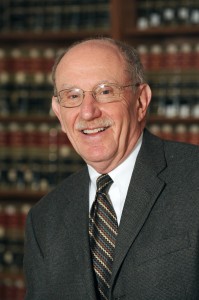CHAPEL HILL – The world will remember Nelson Mandela as one of the greatest freedom fighters in history. As ceremonies to honor the former South African President are observed across the globe, former Mayor of Chapel Hill Ken Broun, a UNC Professor of Law who spent extensive time in the leader’s homeland, recalled his encounters with those who knew Mandela.
Broun has been traveling to South Africa to teach Trial Advocacy through the country’s Black Lawyers Association since 1986. He published several writings about Mandela, including: Black Lawyers, White Courts, an oral history of Black lawyers during and after the end of apartheid, and Saving Nelson Mandela: The Rivonia Trial and the Fate of South Africa.
The Rivonia Trial, the trial which led to Mandela’s imprisonment, took place between 1963 and 1964. Ten leaders of the African National Congress were charged for committing crimes against the government.
Mandela was sentenced to life in prison, of which he served 27 years. He would go on to become the giant of the anti-apartheid movement and was elected president in 1994.
During his travels and teaching stints in South Africa, Broun met some of Mandela’s lawyers from the Rivonia Trial and fellow prison mates who had also served time on Robben Island. They described to Broun the effect Mandela had on those he encountered.
“He was a person of great physical charms. He was a boxer. He was a handsome man with a kind of twinkle in his eye,” Broun said. “But he was also a person who had a very easygoing nature and a wonderful sense of humor.”
In 1964, just months before he was sentenced to life in prison, Mandela made his famous “Speech from the Dock” in which he proclaimed that he was “prepared to die” for a democratic South Africa
“While he was in prison during the 27 years [which he served], he became increasingly the symbol of the anti-apartheid movement,” Broun said. “He was the rallying point.”
Broun explained that during the latter part of Mandela’s imprisonment, he had more contact with the outside world and became an integral part of the ANC’s planning processes.
“I got to think about the trial and was told and confirmed that when the trial began in 1963, everyone expected all of the defendants, including Mandela, to be executed. I was interested in what happened during the course of that eight- or nine-month trial to change the result from death to life imprisonment,” Broun said.
“I also thought about what an execution of Mandela in 1964 would have meant for South Africa and the world.”
As South Africa now moves forward without Mandela, Broun said he will be watching to see if the measures which Mandela helped to push through, such as the death penalty ban and South African constitutional protection of an individual regardless of sexual orientation, are upheld.
“I think there are some conservative elements in the country, people of all races in the country, who might be interested in overturning those ideals now that Mandela is gone.”
US President Barack Obama delivered a eulogy to Mandela Tuesday at the FNB soccer stadium in Johannesburg. Like the late South African president, Obama, too, was the first Black president of his country.
Obama said this of Mandela: “He changed laws, but he also changed hearts.”
Broun said that he thought Obama’s speech captured Mandela’s spirit “extremely well.”
Broun will travel to South Africa again this fall to teach a seminar on the country’s legal system.


